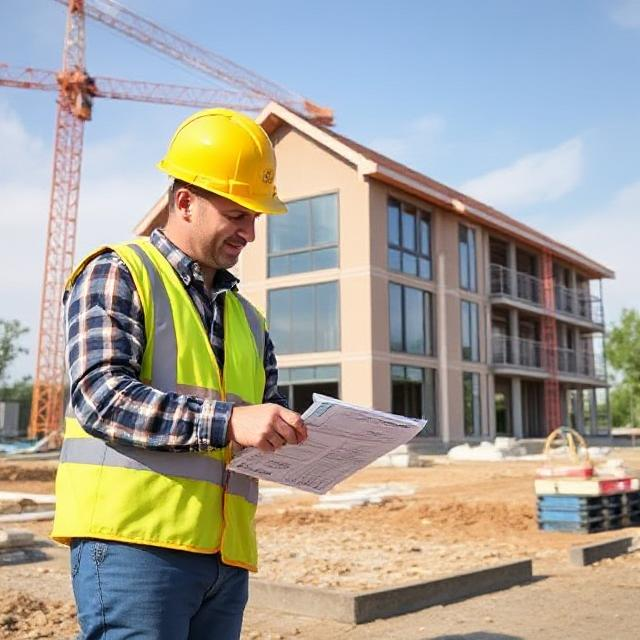Construction loans are specialized financing options designed to fund the building of a home or other structure. Typically, these loans require a down payment of 20-30% of the project cost. However, securing a construction loan with no money down is rare but not impossible. Below, we’ll explore strategies for both the USA and Canada , along with tips to improve your chances of approval.
1. Understanding Construction Loans
Before diving into how to secure a no-money-down construction loan, it’s important to understand how they work:
- Short-Term Financing: Construction loans are typically short-term (6 months to 1 year) and cover the cost of building the property.
- Draw Schedule: Funds are released in stages (draws) as construction progresses.
- Conversion to Mortgage: Once construction is complete, the loan is often converted into a traditional mortgage.
Most lenders require a significant down payment because construction loans are considered high-risk. However, there are creative ways to minimize or eliminate upfront costs.
2. Strategies for the USA
A. Use Government-Backed Programs
In the USA, government-backed programs can help reduce or eliminate the need for a down payment:
- USDA Rural Development Loans
- These loans are available for building homes in eligible rural areas.
- No down payment required.
- Income limits apply, so check if you qualify based on your location and earnings.
- VA Construction Loans
- Available to eligible veterans, active-duty service members, and their families.
- No down payment required.
- The VA guarantees the loan, making it less risky for lenders.
- FHA One-Time Close Construction Loans
- Combines construction financing and a permanent mortgage into one loan.
- Requires as little as 3.5% down , but some lenders may offer promotions or grants to cover this amount.
B. Negotiate with Builders or Developers
Some builders or developers may offer incentives to attract buyers:
- Builder Financing: Some builders partner with lenders to offer zero-down construction loans.
- Land Incentives: If the builder owns the land, they might include it in the deal, reducing upfront costs.
C. Leverage Grants and Assistance Programs
- Research local and state housing assistance programs that provide down payment assistance or grants.
- Nonprofits like Habitat for Humanity may also offer low-cost or no-cost construction opportunities for qualifying individuals.
D. Owner-Builder Loans
If you’re experienced in construction, you can act as your own contractor (owner-builder). Some lenders may offer more flexible terms, including reduced or no down payment, though this is uncommon.
3. Strategies for Canada
A. CMHC-Insured Loans
The Canada Mortgage and Housing Corporation (CMHC) insures construction loans, which can make them more accessible:
- Low Down Payment Options: With CMHC insurance, you may qualify for a down payment as low as 5% for homes under $500,000 CAD.
- No Down Payment for Indigenous Borrowers: Indigenous individuals may qualify for special programs with no down payment through organizations like the First Nations Market Housing Fund (FNMHF) .
B. Self-Build Mortgages
Self-build mortgages allow you to finance the construction of your home. While most require a down payment, some lenders may offer creative solutions:
- Progressive Draws: Funds are released in stages, and you may be able to negotiate lower upfront costs.
- Equity in Land: If you already own the land, its value may count toward your equity, reducing the need for a cash down payment.
C. Provincial and Municipal Programs
Many provinces and municipalities in Canada offer affordable housing programs:
- Ontario Renovates: Provides financial assistance for home construction or renovations.
- BC Housing Programs: Offers grants and low-interest loans for first-time homebuilders.
- Alberta First Home Owner Program: Provides down payment assistance for new home construction.
D. Partner with a Builder
Similar to the USA, partnering with a builder who offers financing can reduce upfront costs. Some builders may even roll the land cost into the loan, eliminating the need for a down payment.
4. General Tips for Securing a No-Money-Down Construction Loan
A. Improve Your Financial Profile
- Credit Score: Aim for a score of 700+ to increase your chances of approval.
- Debt-to-Income Ratio: Keep your DTI below 43% (preferably closer to 36%).
- Stable Income: Provide proof of consistent income to reassure lenders.
B. Use Land Equity
If you already own land, its value can serve as collateral, reducing the lender’s risk. Some lenders may allow you to use the land’s equity to cover the down payment.
C. Explore Private Lenders
Private lenders or hard money lenders may offer no-money-down construction loans, but interest rates will likely be higher. This option is best for short-term financing or if you plan to refinance later.
D. Negotiate Seller Concessions
If you’re purchasing land and financing construction, negotiate with the seller to cover closing costs or other fees, effectively reducing your out-of-pocket expenses.
E. Combine Multiple Financing Sources
Consider combining multiple sources of funding:
- Personal savings for smaller costs.
- A small personal loan for initial expenses.
- A construction loan for the bulk of the project.
5. Risks and Considerations
While no-money-down construction loans sound appealing, they come with risks:
- Higher Interest Rates: Lenders may charge higher rates to compensate for the lack of a down payment.
- Stricter Requirements: You’ll need excellent credit and strong financials to qualify.
- Limited Options: Few lenders offer true no-money-down construction loans, so your choices may be limited.
Final Thoughts
Securing a construction loan with no money down in the USA or Canada requires creativity, research, and a solid financial profile. Start by exploring government-backed programs, negotiating with builders, and leveraging grants or assistance programs. Always compare multiple lenders and read the fine print to ensure you’re getting the best deal.
If you’re serious about pursuing this path, consider consulting with a mortgage broker or financial advisor who specializes in construction loans. They can help you navigate the process and find the best options tailored to your situation.
Let me know if you’d like more details on any specific program or strategy! 😊





